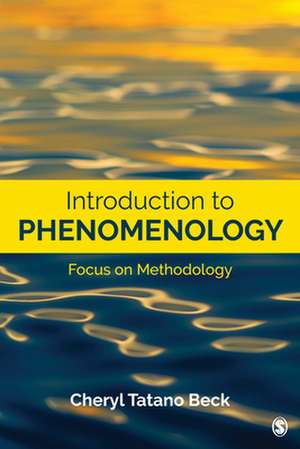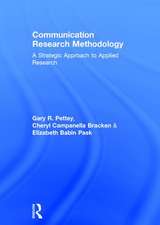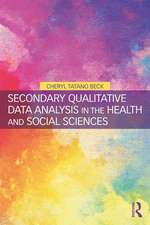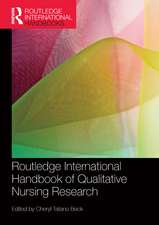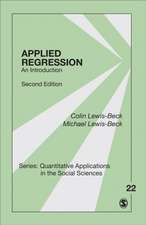Introduction to Phenomenology: Focus on Methodology
Autor Cheryl Tatano Becken Limba Engleză Paperback – 30 apr 2020
Preț: 405.33 lei
Preț vechi: 519.66 lei
-22% Nou
Puncte Express: 608
Preț estimativ în valută:
77.58€ • 84.30$ • 65.21£
77.58€ • 84.30$ • 65.21£
Carte disponibilă
Livrare economică 31 martie-14 aprilie
Livrare express 14-20 martie pentru 25.74 lei
Preluare comenzi: 021 569.72.76
Specificații
ISBN-13: 9781544319551
ISBN-10: 154431955X
Pagini: 224
Dimensiuni: 152 x 229 x 18 mm
Greutate: 0.34 kg
Ediția:1
Editura: SAGE Publications
Colecția Sage Publications, Inc
Locul publicării:Thousand Oaks, United States
ISBN-10: 154431955X
Pagini: 224
Dimensiuni: 152 x 229 x 18 mm
Greutate: 0.34 kg
Ediția:1
Editura: SAGE Publications
Colecția Sage Publications, Inc
Locul publicării:Thousand Oaks, United States
Recenzii
The structural flow of the text makes perfect sense. Beginning with the basic underpinnings, it offers explanations of "why" different methods based on underpinnings exist. Examples help solidify these concepts, which are often overwhelming and unorganized. This text has them all in one place, explained concisely, and provides proper cause/format to compare/contrast to assist in understanding which methodology makes logical sense to use for answering your research question.
This book was clearly written by a seasoned researcher and expert teacher who understands the complexity of doing phenomenology with quality and rigor with the goal of understanding life experiences of people in a way to provide insight and promote understanding.
This textbook offers a rarely found introduction to a complex philosophy that is also used as a research methodology. It guides students, faculty, and readers into the complex form of research known as phenomenological inquiry in its various styles, and without disappointing the reader throughout. It uses simple language to explain a complex style of human science research. This is a must read for all those who are new to phenomenology, and is especially useful to novice researchers who need to develop a phenomenological research study.
It addresses a genuine need in qualitative research literature, especially if the author can write clearly about these complex ideas for students and researchers to truly understand what empirical phenomenology is about. Having useful, purposeful examples is a key asset as well.
...this book contributes uniquely to emphasizing the methods and procedures of phenomenological research, and this is an obvious passion and goal of the author.
There are many strengths of this book, including organizing key authors by descriptive or interpretive phenomenology. Focusing more on analysis, and use of examples for analysis. Explaining how philosophy impacts methods sounds promising. I love the last two chapters: phenomenology proposals, and getting published! I feel this would help me as a faculty member!
This book was clearly written by a seasoned researcher and expert teacher who understands the complexity of doing phenomenology with quality and rigor with the goal of understanding life experiences of people in a way to provide insight and promote understanding.
This textbook offers a rarely found introduction to a complex philosophy that is also used as a research methodology. It guides students, faculty, and readers into the complex form of research known as phenomenological inquiry in its various styles, and without disappointing the reader throughout. It uses simple language to explain a complex style of human science research. This is a must read for all those who are new to phenomenology, and is especially useful to novice researchers who need to develop a phenomenological research study.
It addresses a genuine need in qualitative research literature, especially if the author can write clearly about these complex ideas for students and researchers to truly understand what empirical phenomenology is about. Having useful, purposeful examples is a key asset as well.
...this book contributes uniquely to emphasizing the methods and procedures of phenomenological research, and this is an obvious passion and goal of the author.
There are many strengths of this book, including organizing key authors by descriptive or interpretive phenomenology. Focusing more on analysis, and use of examples for analysis. Explaining how philosophy impacts methods sounds promising. I love the last two chapters: phenomenology proposals, and getting published! I feel this would help me as a faculty member!
Cuprins
List of Tables and Figures
Acknowledgments
About the Author
Chapter 1. Introduction
Part 1. Philosophical Underpinnings of the Methodology
Chapter 2. Philosophy of Phenomenology
Edmund Husserl
Martin Heidegger
Maurice Merleau-Ponty
Hans-Georg Gadamer
Part 2. Descriptive Phenomenology
Chapter 3. Paul Colaizzi’s Descriptive Phenomenological Methodology
Research Question
Sample
Data Collection
Data Analysis
The Lived Experience of Postpartum Depression
Examples of Research from Various Disciplines
Chapter 4. Amedeo Giorgi’s Descriptive Phenomenological Methodology
Research Question
Sample
Data Collection
Data Analysis
Examples of Published Studies Using Giorgi’s Descriptive Phenomenological Methodology
Chapter 5. Adrian van Kaam’s Descriptive Phenomenological Methodology and Clark Moustakas’s Modification
Research Question
Sample
Data Collection
Data Analysis
Examples of a Study from My Program of Research
Additional Examples of Studies Using Van Kaam’s Descriptive Phenomenological Approach
Clark Moustakas’s Modification of van Kaam’s Approach
Examples of Moustakas’s Modification of Van Kaam’s Approach
Comparison of van Kaam’s Methodology and Moustakas’s Modification
Chapter 6. Karin Dahlberg’s Descriptive Phenomenological Reflective Lifeworld Research
Introduction to the Reflective Lifeworld Methodology
Descriptive Phenomenological Reflective Lifeworld Approach
Comparison of Five Descriptive Phenomenological Methodologies
Choosing one of the Descriptive Phenomenological Methods
Part 3. Interpretive Phenomenology
Chapter 7. Max van Manen’s Hermeneutic Phenomenological Approach
Research Question
Sample
Data Collection
Data Analysis
Examples of International Research from Various Disciplines Using Van Manen’s Methodology
Chapter 8. Patricia Benner’s Interpretive Phenomenological Methodology
Sample
Data Analysis
International Examples of Studies Using Benner’s Interpretive Phenomenological Methodology
Chapter 9. Jonathan Smith’s Interpretive Phenomenological Analysis (IPA)
Research Questions
Sample
Data Collection
Data Analysis
International Examples of IPA Research from Various Disciplines
Chapter 10. Karin Dahlberg’s Hermeneutic Reflective Lifeworld Research Methodology
Hermeneutic Reflective Lifeworld Methodology
Comparison of the Four Interpretive Phenomenological Methodologies
Choosing One of the Interpretive Phenomenological Methodologies
Part 4. Evaluating, Writing, and Teaching Phenomenology
Chapter 11. Trustworthiness in Qualitative Research
Trustworthiness vs. Reliability and Validity
Strategies for Enhancing Quality
Criteria for Evaluating Phenomenological Research
Criteria for Evaluating Qualitative Research in General
Student Exercise for Evaluating a Phenomenological Study
Chapter 12. Phenomenological Writing
Strategies
Figures
Qualitative Reporting Checklists
End-of-Chapter Study Activities
Chapter 13. Developing a Program of Research Using Phenomenology
Chapter 14. Teaching Phenomenology: Preparing Our Next Generation of Researchers
Other Faculty Members’ Teaching Strategies
My Teaching Strategies
Phenomenology Tips
Glossary
Appendix A. First Study Activity for Students
Appendix B. Second Study Activity for Students
Appendix C. Mothers’ Experiences of Posttraumatic Growth Following Traumatic Childbirth: A Descriptive Phenomenological Study Proposal
Appendix D. The Impact of Traumatic Birth on Mothers Caring for Their Children: An Interpretive Phenomenological Study Proposal
Index
Acknowledgments
About the Author
Chapter 1. Introduction
Part 1. Philosophical Underpinnings of the Methodology
Chapter 2. Philosophy of Phenomenology
Edmund Husserl
Martin Heidegger
Maurice Merleau-Ponty
Hans-Georg Gadamer
Part 2. Descriptive Phenomenology
Chapter 3. Paul Colaizzi’s Descriptive Phenomenological Methodology
Research Question
Sample
Data Collection
Data Analysis
The Lived Experience of Postpartum Depression
Examples of Research from Various Disciplines
Chapter 4. Amedeo Giorgi’s Descriptive Phenomenological Methodology
Research Question
Sample
Data Collection
Data Analysis
Examples of Published Studies Using Giorgi’s Descriptive Phenomenological Methodology
Chapter 5. Adrian van Kaam’s Descriptive Phenomenological Methodology and Clark Moustakas’s Modification
Research Question
Sample
Data Collection
Data Analysis
Examples of a Study from My Program of Research
Additional Examples of Studies Using Van Kaam’s Descriptive Phenomenological Approach
Clark Moustakas’s Modification of van Kaam’s Approach
Examples of Moustakas’s Modification of Van Kaam’s Approach
Comparison of van Kaam’s Methodology and Moustakas’s Modification
Chapter 6. Karin Dahlberg’s Descriptive Phenomenological Reflective Lifeworld Research
Introduction to the Reflective Lifeworld Methodology
Descriptive Phenomenological Reflective Lifeworld Approach
Comparison of Five Descriptive Phenomenological Methodologies
Choosing one of the Descriptive Phenomenological Methods
Part 3. Interpretive Phenomenology
Chapter 7. Max van Manen’s Hermeneutic Phenomenological Approach
Research Question
Sample
Data Collection
Data Analysis
Examples of International Research from Various Disciplines Using Van Manen’s Methodology
Chapter 8. Patricia Benner’s Interpretive Phenomenological Methodology
Sample
Data Analysis
International Examples of Studies Using Benner’s Interpretive Phenomenological Methodology
Chapter 9. Jonathan Smith’s Interpretive Phenomenological Analysis (IPA)
Research Questions
Sample
Data Collection
Data Analysis
International Examples of IPA Research from Various Disciplines
Chapter 10. Karin Dahlberg’s Hermeneutic Reflective Lifeworld Research Methodology
Hermeneutic Reflective Lifeworld Methodology
Comparison of the Four Interpretive Phenomenological Methodologies
Choosing One of the Interpretive Phenomenological Methodologies
Part 4. Evaluating, Writing, and Teaching Phenomenology
Chapter 11. Trustworthiness in Qualitative Research
Trustworthiness vs. Reliability and Validity
Strategies for Enhancing Quality
Criteria for Evaluating Phenomenological Research
Criteria for Evaluating Qualitative Research in General
Student Exercise for Evaluating a Phenomenological Study
Chapter 12. Phenomenological Writing
Strategies
Figures
Qualitative Reporting Checklists
End-of-Chapter Study Activities
Chapter 13. Developing a Program of Research Using Phenomenology
Chapter 14. Teaching Phenomenology: Preparing Our Next Generation of Researchers
Other Faculty Members’ Teaching Strategies
My Teaching Strategies
Phenomenology Tips
Glossary
Appendix A. First Study Activity for Students
Appendix B. Second Study Activity for Students
Appendix C. Mothers’ Experiences of Posttraumatic Growth Following Traumatic Childbirth: A Descriptive Phenomenological Study Proposal
Appendix D. The Impact of Traumatic Birth on Mothers Caring for Their Children: An Interpretive Phenomenological Study Proposal
Index
Notă biografică
Cheryl Tatano Beck, DNSc, CNM, FAAN is a distinguished professor in the School of Nursing at the University of Connecticut. Her program of research is focused on perinatal mood and anxiety disorders. She has developed the Postpartum Depression Screening Scale (PDSS) from her series of qualitative studies on postpartum depression. She also has developed a theory of traumatic childbirth, called the Ever Widening Ripple Effect. This midrange theory is based on her series of qualitative studies on traumatic childbirth and its resulting PTSD. She serves on the editorial board of Global Qualitative Nursing Research, Journal of Perinatal Education and Advances in Nursing Science. She has written:
- Beck, C. T. (2016). Developing a Program of Research in Nursing. New York: Springer Publishing Company.
- Long, T. & Beck CT (2017). Writing in nursing: A brief guide. New York: Oxford University Press.
- Beck, C. T., Driscoll, J. W., & Watson, S. (2013). Traumatic childbirth. New York: Routledge.
- Beck, C.T. (Ed.) (2013). Routledge International Handbook of Qualitative Nursing Research. New York: Routledge.
- Beck, C.T. & Driscoll, J.W. (2006). Postpartum mood and anxiety disorders: A clinician¿s guide. Sudbury, Ma.: Jones & Bartlett Publishers.
- Polit, D. F., & Beck, C.T. (2018). Essentials of Nursing Research: Appraising Evidence for Nursing Practice. (9th Ed). Philadelphia: Lippincott Williams, & Wilkins.
- Polit, D. F., & Beck, C.T. (2017). Nursing Research: Generating and assessing evidence for nursing practice (10th Ed). Philadelphia: Lippincott Williams and Wilkins.
Descriere
Introduction to Phenomenology: Focus on Methodology breaks down the history, methodology, and application so students can more easily write proposals and conduct phenomenological research. This book provides a clear picture of phenomenology’s applications to social, behavioral, and health sciences, covering both interpretive and descriptive phenomenology from research design through analysis.
